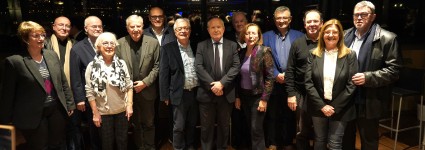Technological sovereignty and digital humanism: how is Europe preparing for 2030?
The generalization of technology and the consolidation of artificial intelligence or machine learning, among others, have brought about structural changes in globalized societies and Europe is just beginning to consider an ethical reflection on technological development and its current and future capabilities. To talk about it, the Catalunya Europa Foundation, in the framework of the cycle “What Europe do we want?” has promoted the conference "Technological sovereignty, digital humanism: how is Europe preparing for 2030?", with the participation of Raquel Jorge, analyst of technological and digital policy at the Real Instituto Elcano, José María Lasalle, director of the Forum of ESADE's Technological Humanism and the participation of Ibán García del Blanco, Member of the European Parliament for the group of the Progressive Alliance of Socialists and Democrats. The session was moderated by Liliana Arroyo, a researcher at the ESADE Institute for Social Innovation.
The starting point of the debate was the document entitled Digital Compass approved in March 2021 by the European Commission. This document marks the digital horizon of the EU and revolves around 4 points. First of all, it focuses on capabilities, and it is that the Digital Compass proposes that more than 20 million Europeans be ICT specialists and that at least 80% of the population has basic digital skills. Second, it focuses on government and, above all, on the digitization of key public services. The third axis has to do with secure and sustainable digital infrastructures, which includes greater connectivity (generalization of 5G) and the development of more secure and climate-neutral data. Finally, the "Digital Compass" focuses on business and the digital transformation of companies. At this point, the Commission has set out to work to ensure that 75% of EU companies use the cloud, Artificial Intelligence and macro data.
For Raquel Jorge, this document seeks the digitization of assets but does not delve into digital sovereignty. Jorge believes that "the Digital Compass could have been much more ambitious." The technology policy analyst also thinks that the European Union should look for new communication and coordination mechanisms that increase the transparency of technology policy decisions. Indeed, MEP Ibán García del Blanco, coordinator of the AIDA Committee (Artificial Intelligence in the Digital Age) has been one of the promoters of 3 reports, approved by the European Parliament, urging the Commission to design a legal framework that promotes innovation in artificial intelligence and, at the same time, respecting ethical standards and protecting citizens from the evolution that this technology may have. For del Blanco, this is a demanding regulatory operation, which is consistent and consistent with European values ??and from a humanistic perspective of technology. The MEP considers that the European Parliament is working very hard on future legislation on artificial intelligence and is in favor of promoting the digital enlightenment of citizens, on the one hand, to provide them with technological tools and , on the other hand, to facilitate adaptation to an increasingly digitalized world.
José María Lassalle considers that for a long time, the EU has been a passive actor “in relation to the development and progressive implementation of the technology industry”. It was not until 2019 that the Commission understood that there was a need for ethical reflection on technological development and its consequences. But even so, "in a context of critical transition to an accelerated postmodernity, with an essentially technological structure of the world, Europe finds itself with few tools and a passive attitude," laments Lassalle.
The strategy of the Digital Compass aims to technologically train citizens and influence the digital market, but leaves behind "the real ability to operate on the control of this data to give tools to citizens to critically treat this data" he explained. the director of the ESADE Forum on Technological Humanism. For Lassalle, Europe currently does not have the right tools to achieve the goals set by 2030. Therefore, a strategic plan is needed to align all of Europe’s assets. Lassalle argues that Europe’s characteristics of the European population (highly educated and high-income) make the data especially interesting, and this gives it a comparative advantage that is not being taken advantage of. "The great value of data and AI is that complexity generates more complexity," said Lassalle. In contrast, the Chinese model of AI is vertical and hierarchical and this makes, according to Lassalle, that “although in the short term China may become a power, in the long run the EU approach will give it a greater competitiveness.
Raquel Jorge added that it is necessary to approach the technological strategy to the citizens with a pleasant language. "The European strategy continues to follow a market logic, the citizen is still treated as a passive and a recipient, and not as an agent of change," he lamented. Liliana Arroyo added a nuance: "Citizens must have the opportunity to participate in the technological debate, but the fact of not wanting or not being able to participate in it, can not make them vulnerable."










